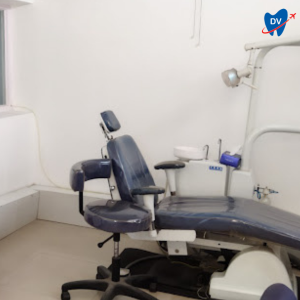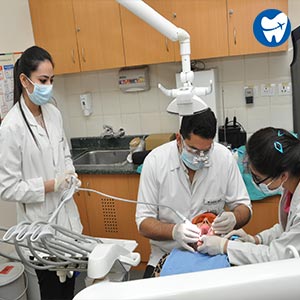Visiting the dentist can be intimidating for any child. It is common for children to be anxious or fearful of getting dental work done. If your child has a challenging medical or dental condition, seeing a pediatric dentist in Chandigarh might help.
Patient Testimonial: Treatment for cavities
In this article, we outline common pediatric dentistry problems and their treatments. We also discuss sedation dentistry and general anesthesia in detail.
If you have a special needs child or somebody who needs safe attentive care, then read on.
You will be able to understand the cost and treatment processes better.
What is Pediatric Dentistry?
Pediatric dentistry is a specialized branch that treats only children and adolescents.
It starts with a baby’s first dental visit at six months and continues until the teenage years.
Hence, a pediatric dentist looks after the oral health of children in various stages of childhood.
They undergo extensive training and practice to care for your child’s teeth, gums, and mouth.
In this article, we will talk about the following in detail:
- Importance of pediatric dentistry
- Common kid’s dental problems and their treatments
- Behavior management practices in kids dentistry
- Sedation and General Anesthesia for children
- Pediatric dentistry for special needs children
- Effect of medications on child’s oral health
Importance of Pediatric Dentistry
Just like adults, children also need timely and appropriate dental care. Childhood is a time in which many dental problems emerge.
In addition, the period of mixed dentition, when permanent teeth are erupting, is challenging for many.
Proper monitoring and treatment at this time are crucial. Maintaining dental health ensures your child’s dental journey until adulthood will be stress-free.
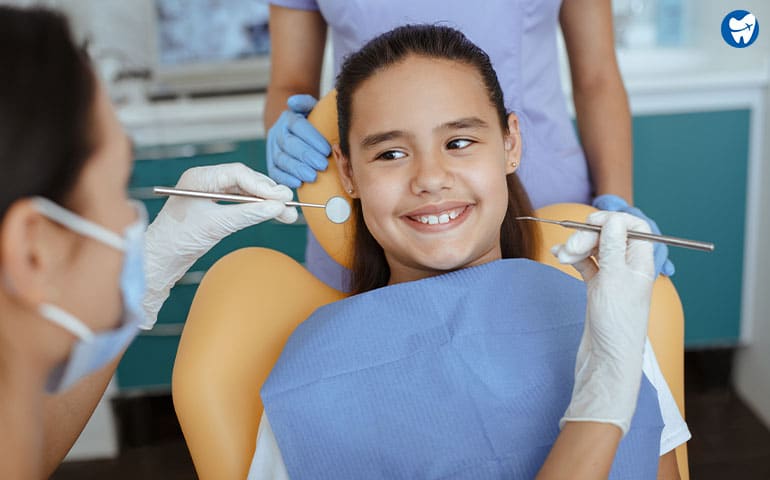
Pediatric Dentistry in Chandigarh, India
For example, many children develop early childhood caries.
Additionally, they also suffer from delayed primary teeth shedding or eruption, leading to alignment issues.
If these problems are not addressed early on, they can become more complicated and costly to treat in the future.
A pediatric dentist undergoes eight years of training to become qualified.
Therefore, they provide safe and reliable dental care for children of all ages. This extra training helps make the child’s dental experience less traumatic.
We recommend visiting a pediatric dentist in Chandigarh as early as six months. This familiarises your kids with the dental settings from an early age.
Child Tooth Problems and Solutions
Tooth decay can occur anytime after the first teeth appear in the mouth.
In toddlers, it is baby bottle tooth decay that poses a problem to oral health.
Also called nursing bottle caries, it occurs when infants sleep with nursing bottles in their mouths.
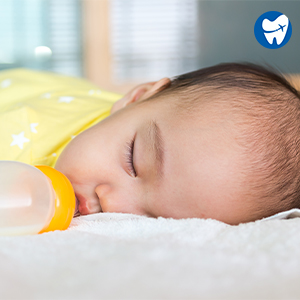
Infant sleep with nursing bottle
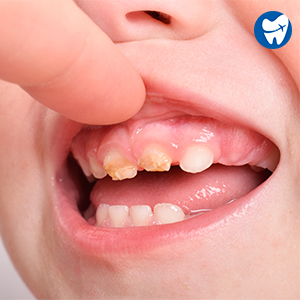
Deteriorated Teeth
To begin with, sugar in milk and baby formula tends to stick to infants’ teeth.
When oral bacteria eat this sugar, they produce acids that attack the tooth enamel.
Consequently, the enamel breaks down, and your baby’s teeth get decayed.
Solution
- Avoid giving nursing milk bottles to your baby when they’re falling asleep. Opt for plain water or a pacifier.
- Control the amount of sugar. Do not dip your infant’s pacifier in honey or any sweet substances.
- If you notice nursing bottle caries, then get treatment right away. A pediatric dentist can safely remove the decay and place protective tooth fillings.
For older children, tooth decay can be a result of improper oral hygiene habits.
It is a problem if your kid consumes many refined carbs, sugar, chocolates, or candies.
Together with a poor diet, irregular brushing makes them prone to decay.
The causes of tooth decay in your child may be multifactorial. Therefore, the treatment should also be comprehensive.
Keep in mind that your child’s untreated cavities can lead to pain and severe infections.
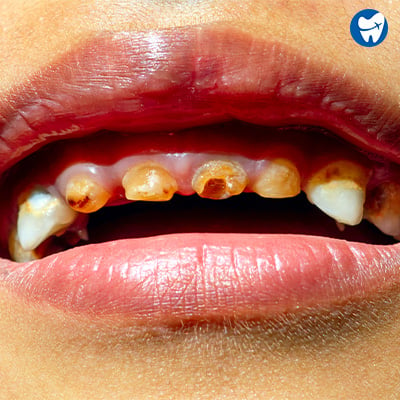
Dental caries in front teeth
Solution
- Teach your children the significance of dental health and regular brushing and flossing.
- A healthy, well-balanced diet plays a crucial role in controlling child tooth decay. [1]
- Sealants are effective in reducing bacteria in carious lesions. [2]
- Topical Fluoride gels and varnishes can help strengthen teeth in growing children.
- Use fluoridated toothpaste for brushing and incorporate fluoridated water in the diet.
- Many treatment options exist for child tooth decay, so visit the dentist regularly. Your pedodontist will advise a filling, crown, or extraction, depending on the severity.
Habits like thumb sucking and tongue thrusting are common in growing children.
Thumb sucking arises because of a need for comfort or security in tense situations.
Although it does not directly impact oral health, it has serious consequences if left unchecked.
Both tongue thrusting and thumb-sucking affect teeth, causing misalignment and bite issues.
Eventually, your child’s speech may also suffer.

Thumb sucking kid
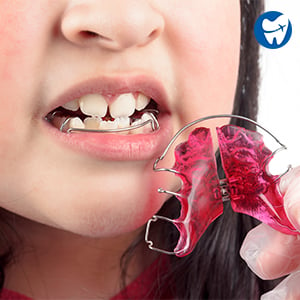
Misaligned teeth
Solution
It’s important to stop your child’s thumb sucking or tongue thrusting whenever you see them.
- Do not try to stop them with force, as this can negatively affect their behavior. Instead, adopt reward systems to influence positive behavior.
- Try to fix the underlying problem by eliminating your child’s anxiety or stress triggers.
- If all else fails, you can always consult an experienced pediatric dentist in Chandigarh. They provide management techniques and oral appliances to stop your child’s habit.
- A speech therapist helps develop alternate swallowing mechanisms in tongue thrusting.
Many children grind their teeth subconsciously when stressed or angry.
Other times it could be because of discomfort when the permanent teeth are erupting.
In all cases, teeth grinding is harmful to the teeth and can lead to severe problems. These include:
- Erosion of the outer enamel
- Yellowing of the teeth
- Increased tooth sensitivity
- Susceptibility to decay
- Increased brittleness of teeth
- Chipping or cracking of teeth
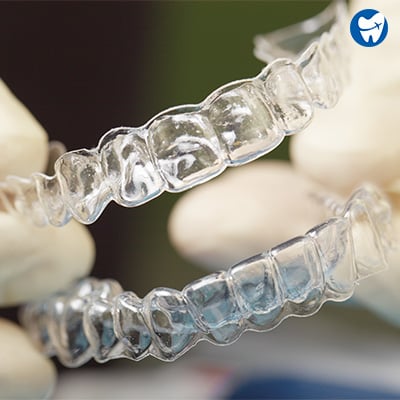
Mouthguard for teeth grinding
Solution
Teeth grinding can be managed with the help of mouthguards or nightguards.
These prevent the upper and lower teeth from coming into contact and getting damaged.
Your pediatric dentist will fit your child with a custom nightguard to correct this habit.
Some kids may be born with a condition called “tongue-tie” or ankyloglossia.
In such cases, the tongue is “tied” to the floor of the mouth, restricting normal movement and speech.
The severity of the tongue tie differs with different children.
Children with tongue-tie:
- Have problems in breastfeeding
- Difficulty in pronouncing sounds
- Dental hygiene problems
- Chewing difficulties
- Gagging or choking issues.
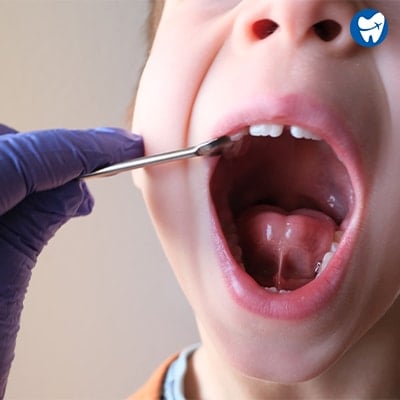
Pediatric patient with a tongue-tie
Solution
An effective way to treat ankyloglossia in an older child is to get tongue tie surgery.
If your child shows feeding difficulties or speech problems, get them evaluated by the pediatrician.
They will refer the case for surgical reconstruction either in-office or in a hospital setting.
Some common causes of tooth pain include
- Decay
- Chipped or cracked teeth
- Improper fillings
- A root infection
- Teeth grinding habit
- Growth of new permanent teeth
Solution
If your child has constant tooth pain, you should get them evaluated by a dentist.
There could be extensive decay, infection, wearing, or cracks in the teeth. Fixing the underlying problem will eliminate tooth pain.
- If decay is extensive then, either a pulpotomy or pulpectomy procedure may be performed.
- When there is an infection in developing teeth, apexification or apexogenesis is performed. This helps seal the root ends of the teeth after the elimination of the infection.
The American Association of Orthodontics advises interceptive orthodontics between ages 7-10. [3]
This is also called preventive orthodontic treatment or phase one treatment.
Preventive orthodontic treatment treats alignment issues before they become serious. At this time, most of the baby teeth are present and permanent teeth are still erupting.
The idea is to catch potential bite problems early on while the jaws are still growing.
This reduces the need for extensive treatment in later years.
The cost of braces for kids these days is no small matter. You can save a lot of expenses in the future by getting preventive orthodontic treatment now.
Solution
Check if your child has speech problems, protruded teeth, or an odd-looking jaw.
Additionally, Thumb sucking, tongue thrusting, mouth breathing can all negatively affect teeth alignment.
Myobrace for kids is a great way to treat such habits in children early on. They allow your child to have good teeth alignment and better jaw growth.
Your child’s orthodontist may also recommend other appliances to correct bite problems.
Full Mouth Restoration For Kids
Negligence with your child’s dental health eventually necessitates a full mouth restoration.
Your child may need a full mouth restoration if they have (some or all) of the problems listed below:
- Multiple decayed teeth
- Chipped or broken teeth from a fall or accident
- Missing or unerupted teeth
- Worn-down teeth from teeth grinding
- Extractions
Full Mouth Restoration For Kids
It is a comprehensive dental treatment for all the affected teeth in the mouth.
Many times, it requires multiple procedures done over several weeks or months. Some common treatments you can expect are:
- Removal of cavities or tooth decay
- Placement of dental fillings
- Restoration of damaged teeth with dental crowns, bridges, or veneers
A complete mouth restoration focuses on improving both the look and function of your child’s oral cavity.
The placement of dental fillings and crowns enhances the smile.
In addition, your child will get relief from tooth pain and any bite problems they might possess.
Restoring the teeth is important to maintain space for the permanent teeth to erupt. Ultimately, your kid will be able to eat, speak and look better.
Behaviour Management in Children
Behavior management is a vital component of kids’ dentistry in Chandigarh.
Some children show unwillingness to follow directions due to fear or anxiety. This ultimately impacts how the dentist delivers the treatment.
Thus, the clinician must use appropriate behavior management methods in the clinic.
This ensures that the treatment is administered smoothly.

Little boy at the dentist | Kids’ Dentistry in Chandigarh, India
Positive Reinforcements And ‘Tell Show Do’
Some children can be managed with positive reinforcements or the ‘tell show do’ technique. Cooperative patient behavior is rewarded with positive reinforcements. [4] For example,
- Positive facial expressions
- Verbal praise
- Appropriate affection
- Toys and Tokens
In the ‘tell show do’ technique, the procedure is first explained verbally to the child.
Then, it is demonstrated by enacting on a parent or sibling. Finally, once the child is comfortable, the procedure is performed on them.
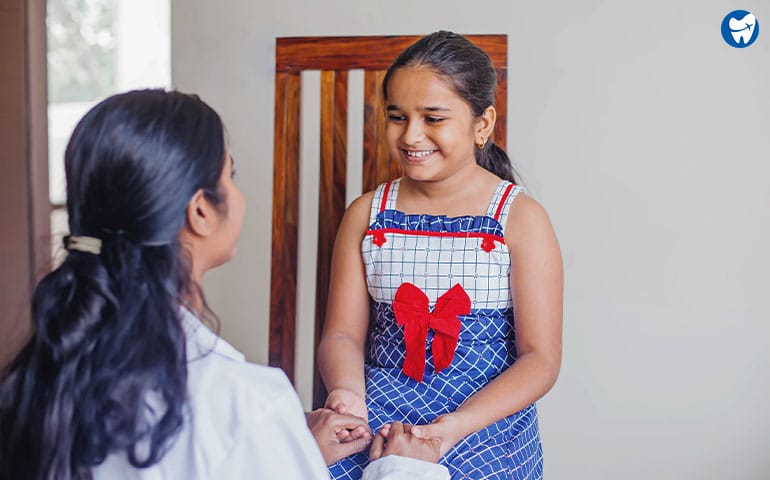
Pediatric dentist talking to the child
From the start of the dental visit, two-way communication between the dentist and child is important. This builds confidence and a feeling of trust.
At all points, the child is considered an active participant in the treatment.
Giving clear affirmative instructions helps the child follow along and be cooperative.
Distraction and Advanced Techniques
Sometimes, distraction techniques are employed to divert the attention of a child. This helps avoid negative behavior by distracting kids.
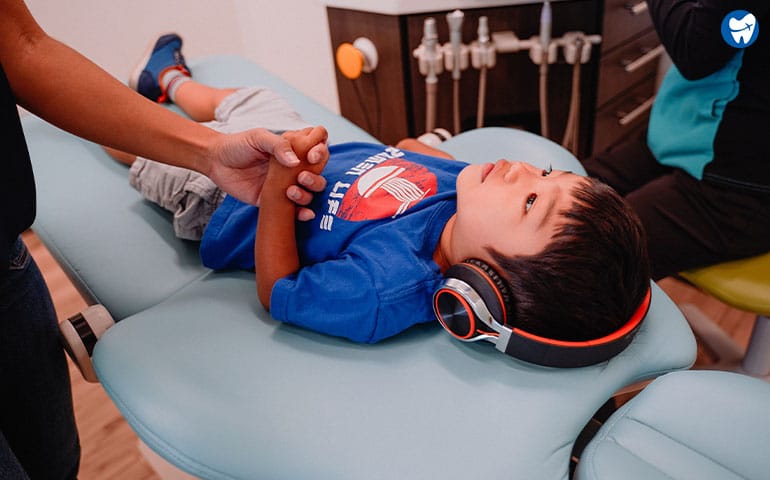
Dental checkup with audio-visual aids
Distractions include:
- Audiovisual aids (music, tv)
- Verbal (telling stories)
- Clinic design (brightly painted walls, child-friendly cartoons, etc.)
Highly anxious or uncooperative kids need advanced management techniques.
These include sedation with nitrous oxide or general anesthesia. Let’s look at what that means.
General Anesthesia for Kids
General Anesthesia in children’s dentistry is used to treat anxious, fearful children or so multiple treatments can be performed in a short amount of time.
Trained anesthesia professionals guide children into deep sleep using medications. In this state, children do not feel any sensations or have ant memory of the procedures. [5]
GA allows stressed or special needs children to undergo lengthy or complex dental procedures with minimal stress.
Why Is My Child Recommended to Have Treatment under GA?
Special Need Dentistry
We recommend your child goes under GA if they are: [6]
- Highly fearful of dental procedures
- Very young and do not understand the need for treatment
- Special needs
- Somebody with many medical issues
- Allergic to local anesthesia
- Unsuitable for conscious sedation
- Cannot sit still or cooperate for long periods, or require several lengthy or complicated dental procedures at once.
What Happens Before the GA Procedure?
Many precautions are taken before administreing general anesthesia in children’s dentistry. All pediatric patients are cleared for GA only after careful evaluation of their medical history.
Your child’s primary care physician or doctor may also be consulted in this matter.
- First, the pediatric dentist will explain the procedure in detail to the parent or caregiver present.
- Then, they will obtain informed consent and provide written instructions to you.
- Furthermore, the anesthesia team will record your kid’s vitals (blood pressure, pulse, blood oxygen levels, etc.).
- These are continuously monitored throughout the procedure.
- Lastly, your child will be awakened and monitored.
Post-operative Instructions
Your child will generally stay ‘asleep’ for 3-4 hours. All their dental treatments can be completed at this time in one sitting.
As parents, you must follow the given post-operative instructions. [7]
- Children will often experience postoperative pain after a tooth extraction or crown placement. Pain can be managed with over-the-counter pain medication.
- Your child should be monitored for 24 hours. It may take several hours for balance and coordination to return to normal.
- Rest and minimal activity is advised after the procedure. Your child can usually return to their regular schedule the next day.
Side effects of GA
| Common | Sometimes | Rare |
| Tooth pain | Dehydration | Nasal bleeding |
| Weakness | Fever | Irregular heart rhythms |
| Drowsiness | Nausea | Breathing problems |
| Confusion | Vomiting | Swollen lips and tongue |
| Hoarse voice and sore throat | Diarrhea and | Allergic reactions |
| Difficulty in eating | Constipation | Issues with the IV line |
Source: Different Aspects of General Anesthesia in Pediatric Dentistry: A Review; Iran J Pediatr. 2016 Apr; 26(2) & Postoperative complications of pediatric dental general anesthesia procedure provided in Jeddah hospitals, Saudi Arabia; BMC Oral Health. 2009 Feb 19;9:6.
FAQs About Anesthesia in Pediatric Dentistry
GA is a safe and efficient way to complete complicated or lengthy dental procedures.
Your child is put to sleep with the help of sedation medications.
Not only will they feel no pain, but they also won’t remember the procedure.
The anesthesia team monitors your child’s vitals the entire time. So there’s a low risk of complications.
GA generally has a very low risk of complications post-procedure. Even with very young children, typical side effects include sleepiness, grogginess, or confusion.
Some other side effects include nausea, chills, and sore throat.
These last only for a couple of hours after surgery and go away fairly quickly. [8]
Some children experience heart arrhythmias, breathing problems, bleeding from the nose, or allergic reactions, but these are extremely rare.
Sleepiness, confusion, improper balance, and slow movements disappear within the first 24 hours after GA.
Your child can resume all normal activities 1-2 days after their procedure. But remember that every child is different and should be allowed to recover at their own pace.
Do not expect your child to wake up immediately after the GA procedure. In most instances, it takes about 45 minutes to an hour for children to wake fully after GA.
Even then, they may experience grogginess or confusion a couple of hours after surgery. [9] So try to help them be as comfortable as you can.
They will monitor your child’s breathing, heart rate, oxygen levels, and blood pressure throughout the procedure.
Anesthetics calculate the exact dose of GA medication required to keep your child pain-free.
If needed, they will adjust the medications for maximum safety.
Patient Testimonials
Severe early childhood caries treated under GA
Special need child treated under GA for early childhood caries
Sedation Dentistry for Kids
While general anesthesia puts your child to sleep completely, conscious sedation does not.
Conscious sedation allows your child to receive dental care in a more calm state.
Dentistry in Chandigarh uses it to provide a safer and more favorable environment for kids.
Moreover, In-chair injuries are prevented as restless and moving children pose safety risks.
There are different sedation options available at the dentist.
- Inhalation sedation – using “laughing gas
- Syrup sedation- for children below five years
- IV (Intravenous) sedation – for deep sedation
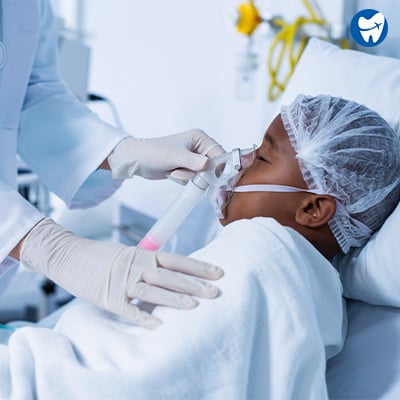
Sedation dentistry in Chandigarh, India
The type of sedation given depends on factors like: [10]
- Age of the child
- Their anxiety levels
- The complexity of dental procedures that need to be performed
- Available time for treatment
- Side Effects of Sedation
Side Effects of Sedation
| Common | Sometimes | Rare |
| Sleepiness or drowsiness | Low blood pressure | Temporary loss of memory |
| Slow reflexes or movements | Unintentional deep or over-sedation | Hypoxia |
| Headache | – | Reduced breathing |
| Nausea | – | Reduced heart activity |
Source: Healthline [11]
FAQs About Sedation Dentistry For Kids
A pediatric dentist uses different sedation options to treat your child. Inhalation sedation (with nitrous oxide or laughing gas) or oral sedation (with syrup medicines) are commonly used.
Laughing gas is the safest and quickest sedation method for children.
It is breathed in through a mask worn on the nose.
If laughing gas sedation is unsuitable for your child, they are given medicines mixed with juice or syrups.
Laughing gas is a mixture of nitrous oxide and oxygen, which helps relax muscles and cause numbness.
It is non-toxic and non-irritant to your child’s air pipe and lungs. [12]
Sedation is a safe and effective way to calm anxious, fearful or restless children. No doubt, a pediatric dentist is fully trained in sedation techniques.
They have the skills, equipment, and emergency support staff to manage unexpected problems.
Before starting the procedure, all precautions are taken to ensure it is safe for your child.
Sedation improves treatment outcomes by:
- Making the patient more comfortable and relaxed
- Creating a less stressful atmosphere for the dental team [13]
- Relieving pain and unpleasant sensations
What is Hospital Dentistry?
Hospital dentistry can be described as dental care that is delivered in a hospital setting.
It is a form of ambulatory care, where same-day procedures are done on an outpatient basis.
Together with the dentist, an entire team of health professionals cares for the patient.
Pediatricians, anesthesiologists, and other medical personnel all work closely together. They function like well-oiled machines to achieve a common goal.
That is, to provide safe, relaxed, and effective dental care to their pediatric patients.
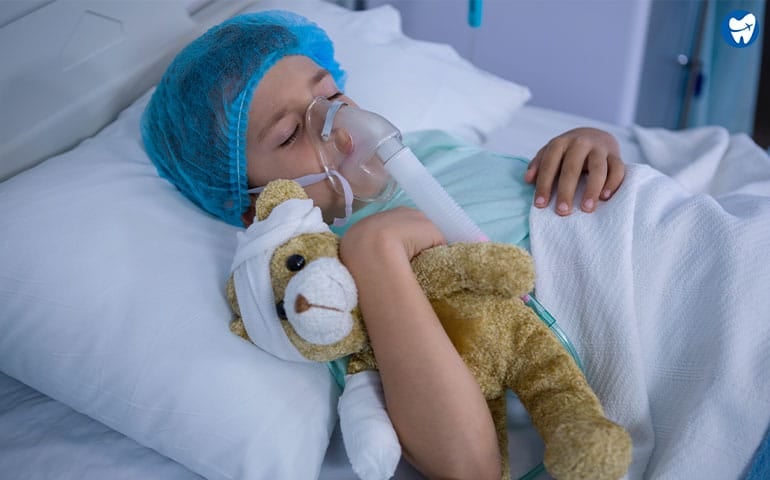
Patient with oxygen mask | Hospital dentistry for kids
Why Use It?
Some kids may not be able to accept dental treatment in a traditional clinic setup. They may be
- Emotionally immature
- Highly anxious
- Special needs, or medically compromised
Such kids may not fully understand the need for dental treatment or are unable to cope with psychologically uncomfortable situations.
For such children, hospital dentistry offers a safe, efficient alternative. Pediatric patients treated in hospital settings benefit from multi-specialty care.
All aspects of their treatment are controlled and monitored by specialists.
This results in an overall improvement in the treatment quality. child’s oral health and physical, emotional, and social quality of life.
How to Prepare Your Child?
Before getting your child admitted for dental surgery, you should know the steps involved.
Discuss with the pediatric dentistry team what you can do to prep your child for GA. You will need to:
- Obtain medical clearance from your child’s physician.
- Get a thorough diagnostic checkup and outline all the treatments required.
- Explain to your child what they’re going to experience without getting into the technicalities.
- Avoid food and drinks from the night before your procedure.
- Talk to the physician about stopping medications your child is on before surgery.
- Let your child pack their favorite blanket or stuffed toy in the hospital bag. These will comfort them in unfamiliar situations and bring a welcome distraction.
- You may pack activities like board games or coloring books to help them pass the time.
How Medications Affect Your Child’s Dental Health
Doctors often prescribe medication to fight infection and treat disease symptoms.
You should be aware that these medicines can hurt your child’s dental health too.
Certain medicines like antibiotics can cause permanent damage to the teeth. Let’s look at these medicines and their effects in detail.
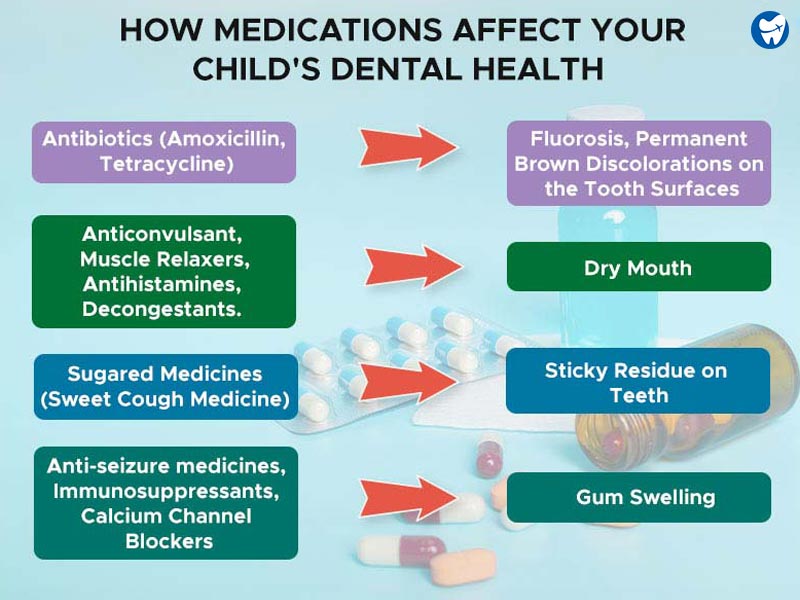
Effect of medications on child’s dental health
Antibiotics
Antibiotics are commonly prescribed medicines to treat bacterial or fungal infections.
They help fight bacteria causing skin and ear infections, strep throat, and even pneumonia.
Amoxicillin is frequently prescribed for ear infections in babies. But, scientific data in recent years has revealed amoxicillin’s damaging effect on the teeth. [14]
Researchers found that kids who took amoxicillin more likely suffered from fluorosis.
Fluorosis is a dental abnormality caused by excess fluoride in the body.
It can cause
- Unattractive white spots
- White lines
- Pitting, or
- Brown stains on the teeth
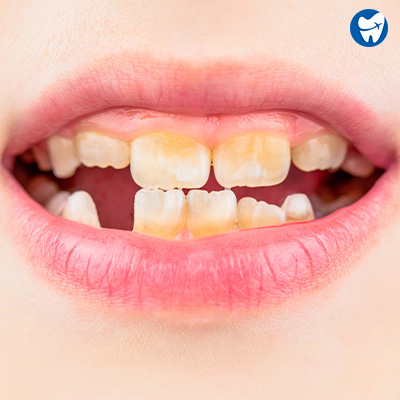
Fluorosis due to consumption of antibiotics
Unchecked amoxicillin use in infants can also lead to permanent tooth developmental problems.
Another antibiotic that negatively affects children’s teeth is tetracycline.
Pediatric dentists strongly advise against giving tetracycline to children younger than eight years.
It causes permanent brown discolorations on the tooth surfaces. These tetracycline teeth stains cannot be removed using conventional means, so it is a problem.
Surprisingly, tetracycline affects the teeth even if the mother takes it when pregnant. [15]
Further, it can also pass to infants through the mother’s breast milk. It hinders the normal development of bones in infants. [16]
Dry Mouth Causing Medicines
Adequate saliva in the mouth is essential to prevent dental disease.
Saliva checks the oral bacteria levels and neutralizes the acids produced by them.
Without saliva to clear food debris, your child may be at increased risk of tooth decay.
Some commonly prescribed medications affect the quantity and quality of saliva in the mouth. They lead to a condition called dry mouth.
Common medicines that are culprits of dry mouth include:
- Anticonvulsants (fits medicine),
- Muscle relaxers,
- Antihistamines,
- Decongestants.
It’s crucial, as parents, to be aware of these changes in your child’s mouth.
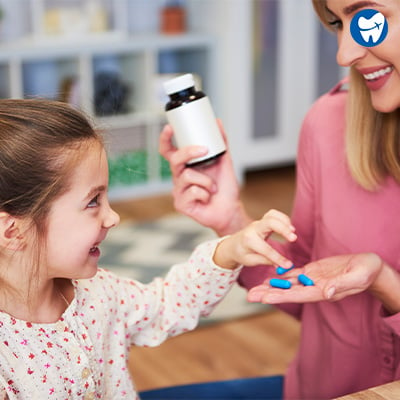
If your child is on these medications, you must take appropriate measures alongside.
A foolproof method to combat dry mouth is by keeping your child hydrated. Get them to drink plenty of water.
This will help in saliva production. You can also give them sugar-free chewing gum to stimulate saliva production in the mouth.
Sweetened Cough Syrups and Other Medicines
It is common knowledge that consuming excess sugar causes tooth decay.
While we are aware of sugar in chocolates or candy, we forget about kids’ medicines.
Pediatric medications are often sweetened to make them more palatable for children. [17]
These pose a danger to your child’s oral health as they leave a sticky residue on teeth.
Avoid giving your child these sugared medicines.
If your kid takes sweet cough medicine, then make sure they brush or rinse thoroughly after.
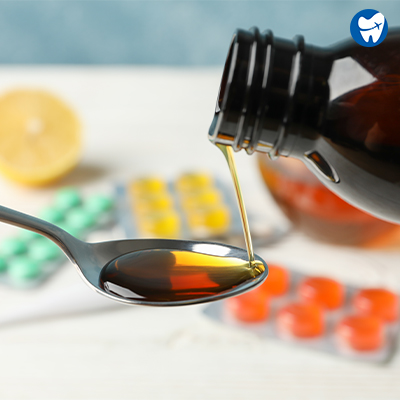
Sweetened cough syrup
Medicines Causing Gum Swelling
Certain medications can cause gum swelling or enlargement. These include:
- Anti-seizure medicines (phenytoin),
- Immunosuppressants, and
- Calcium channel blockers (nifedipine, amlodipine, etc.)
Children on such medications should be encouraged to follow meticulous oral hygiene practices.
Best Pediatric Dentist in Chandigarh
About the Hospital
Max Dental Care is a multispeciality clinic located in Mohali, India. With a hospital-based structure, the dental wing is led by industry expert Dr. Rohini Malik.
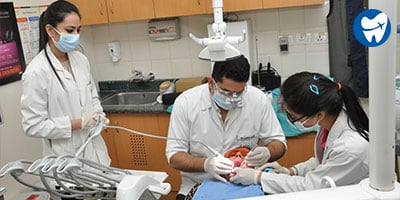
Max Dental Care
- Max Dental Care houses an exceptional in-house pediatric dentistry department in Chandigarh.
- They aim to create a positive and nurturing dental environment for children of all ages.
- Dr. Malik is an accomplished pediatric dentist in Chandigarh, heading Max Dental Care.
- The team uses state-of-the-art equipment and polished techniques to deliver flawless dental care.
Pediatric Dentist in Chandigarh

Expertise
PedodonticsEducation
Pandit Bhagawat Dayal Sharma University of Health Sciences- Certifications: Clear Aligner Therapy, Myofunctional Orthodontics, Esthetic Smile Design, Conscious Sedation.
- B.D.S: Kurukshetra University, Haryana, India
- M.D.S: Pandit Bhagwat Dayal Sharma University of Health Sciences, Haryana, India.
Cost
There would be times when your kid needs major dental work and would be advised GA or sedation.
This will make you feel that the cost of pediatric dentistry in Chandigarh is high. On the contrary, this is far from the truth.
The cost is nothing compared to what you would eventually pay if you delay your child’s dental treatment.
Or if you get substandard care at a lower price from a small clinic. You will have to rectify their mistakes by paying much more.
At the end of the day, you want your child to get safe dental treatment. Remember that it is always risky to get treated by inexperienced dentists.
You do not want to subject your child to the psychological trauma of repeat procedures.
Hence, paying a little extra now may save you thousands of rupees tomorrow!
Get best dental services for your child
Contact us today!Conclusion
Your child deserves the best possible dental care.
Whether it’s preventive treatments, fillings, extractions, or just a general checkup, they need a warm and caring environment to overcome their dental fears.
Thus, heading to a pediatric dentist in Chandigarh will ensure that your child’s teeth are well taken care of.
So what are you waiting for? Give us a call or reach out to us on our website. We look forward to having you!
FAQs About Pediatric Dentistry
Consult a dentist near you if your child has mouth breathing. They will prescribe a simple appliance to help correct the habit.
The device opens up the palate and sinuses and aids in nasal breathing.
Sometimes, an obstruction in the nose (swollen tonsils or adenoids) can cause mouth breathing.
These can be successfully removed with surgery.
Teeth grinding is usually associated with higher stress levels and anxiety.
Mental stress or aggression in children as young as 5-6 years may manifest physically.
Often, psychological factors are involved, and managing these may help reduce teeth grinding.
Tooth decay in children can be treated easily by a dentist.
The dentist will excavate the decay and fill the cavity with tooth-colored material.
Depending on the extent of decay, your pediatric dentistry team in Chandigarh may perform a pulpotomy or pulpectomy procedure.
If your toddler has early tooth decay, it can be reversed. Your pediatric dentist may prescribe a fluoride toothpaste, gel, or rinse to be applied.
This helps in the remineralization of decayed tooth structure. [18]
Additionally, the dentist can apply sealants to the back teeth. This prevents bacteria and food from getting trapped.
Ultimately, you should take steps to limit your kid’s dietary intake of sugar. This will help their teeth recover and heal from decay.
The genetic composition of children with developmental disabilities makes them prone to dental problems.
In general, they suffer from delayed teeth eruption, smaller teeth, spacing, and bite issues.
They have a larger tongue and a small upper jaw. They have a limited understanding of oral health and the ability to brush or floss.
In addition, a weakened immune system makes them more prone to gum disease or cavities.
Hospital dentists work with an entire team of medical professionals to provide dental care.
They consult general physicians, specialists, anesthesiologists, surgeons, and other personnel in the hospitals.
Not only do they treat patients with disease or disabilities, but they also treat trauma cases.
Want to know the next best steps for your child?
Yes, please!


